TODAY’S READING FROM THE OLD TESTAMENT- 2 SAMUEL 23:24-24:25
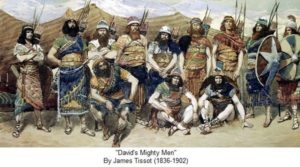 Remember the ragtag army that initially gathered around David when he was a refuge fleeing King Saul in the cave of Adullam? (1 Samuel 22:1) They were described then as men who were “in distress, in debt and discontent.” They did not sound very promising. They soon became known as “David and his men” and later as “The Mighty Men.”
Remember the ragtag army that initially gathered around David when he was a refuge fleeing King Saul in the cave of Adullam? (1 Samuel 22:1) They were described then as men who were “in distress, in debt and discontent.” They did not sound very promising. They soon became known as “David and his men” and later as “The Mighty Men.”
Yesterday we read about ‘the three mighty men,’ Adino, Eleazar, and Shammah.
 Abishai received great honor but “did not attain unto The Three.” The competition was quite stiff. Benaiah, who slew a lion in a pit on a snowy day, received honorable mention, but he also “did not attain to The Three.”
Abishai received great honor but “did not attain unto The Three.” The competition was quite stiff. Benaiah, who slew a lion in a pit on a snowy day, received honorable mention, but he also “did not attain to The Three.”
In verses 24-39, we read the names of the rest of ‘the mighty men,’ 37 in all.
Included in this list (v. 39) is a sad reminder of David’s sin. David sinned against and murdered one of his mighty men, Uriah, the Hittite, when he tried to cover up his adulterous affair with Uriah’s wife, Bathsheba (2 Samuel 23:29).
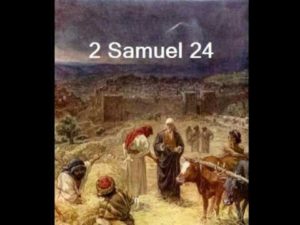 In Chapter 24, we read once again that Israel and David anger the Lord. When David committed adultery with Bathsheba, ‘it was evil in the sight of the Lord’ (2 Samuel 11:27), and David would be chastised for it. Whom the Lord loves, he disciplines.
In Chapter 24, we read once again that Israel and David anger the Lord. When David committed adultery with Bathsheba, ‘it was evil in the sight of the Lord’ (2 Samuel 11:27), and David would be chastised for it. Whom the Lord loves, he disciplines.
We don’t know what it was about Israel’s behavior that angered the Lord. There are so many events to choose from. Perhaps because they were so unfaithful to follow Absalom and Sheba in their rebellions? David is incited to order a census. The Lord did not call for it. In his insecurity, perhaps, David wanted to test the solidity of the people’s commitment and know how vast his kingdom had become. We see how power and position can corrupt the heart. It was pride and reliance on his own strength and his own numbers that had captivated his heart. This should give us pause when we start new projects. What is the motive?
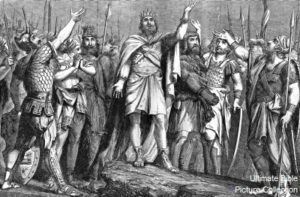 In 1 Chronicles 21, we learn that Satan was also involved in inciting David to number the people.
In 1 Chronicles 21, we learn that Satan was also involved in inciting David to number the people.
Joab, David’s nephew, did his best to dissuade David from making this mistake. So did the other commanders of his army.
2 Samuel 24:3 3 But Joab said to the king, “Now may the LORD your God add to the people a hundred times as many as they are, while the eyes of my lord the king still see; but why does my lord the king delight in this thing?”
2 Samuel 24:4 4 Nevertheless, the king’s word prevailed against Joab and against the commanders of the army. So Joab and the commanders of the army went out from the presence of the king to register the people of Israel.
The numbering of Israel took nine months and twenty days. Joab gave David the numbers. There were 800,000 valiant men in Israel who drew the sword and 500,000 in Judah.
In 1 Chronicles 21, the number is larger. We also learn that Joab did not include Levi and Benjamin in the numberings. The Bible Knowledge Commentary offers this insight.
The figures in 1 Chronicles are 1,100,000 men in Israel and 470,000 in Judah, but the chronicler wrote that the Levites and Benjamites were not included (1 Chron. 21:5-6). The reconciliation of the data may lie in the possibility that 1,100,000 describes the grand total for Israel, including the standing army, which consisted of 12 units of 24,000 men each (288,000, 1 Chron. 27:1-15) plus 12,000 especially attached to Jerusalem and the chariot cities (2 Chron. 1:14). These 300,000 subtracted from 1,100,000 would yield the 800,000 figure in 2 Samuel 24:9. Also, the chronicler may not have included the 30,000-man standing army of Judah (6:1), whereas they were included in chapter 24. This would raise the 470,000 total of Chronicles to the 500,000 of Samuel. This is only one solution, but with so little information available as to how the sums were obtained, nothing further can be said with certainty.
David recognizes he has sinned against the Lord and grieved the Spirit. He repents on his prideful error.
2 Samuel 24:10 10 Now David’s heart troubled him after he had numbered the people. So David said to the LORD, “I have sinned greatly in what I have done. But now, O LORD, please take away the iniquity of Your servant, for I have acted very foolishly.”
 The word of the Lord comes to David through the prophet Gad that he and his people must receive the due punishment for their sins. The Lord offers him the option of 7 years of famine, three months of war, or 3 days of pestilence.
The word of the Lord comes to David through the prophet Gad that he and his people must receive the due punishment for their sins. The Lord offers him the option of 7 years of famine, three months of war, or 3 days of pestilence.
David tells Gad that he puts his trust in God’s mercy and trusts His righteous dealings, “but do not let me fall into the hands of man.”
So a pestilence is sent upon the land, and 70,000 men die.
2 Samuel 24:16 16 When the angel stretched out his hand toward Jerusalem to destroy it, the LORD relented from the calamity and said to the angel who destroyed the people, “It is enough! Now relax your hand!” And the angel of the LORD was by the threshing floor of Araunah the Jebusite.
David is grieved that people are suffering because of his sin. He cries out to the Lord as he sees the angel striking down people. The prophet tells David that the plague can be arrested if he erects an altar on the threshing floor of Araunah and makes offerings upon it.
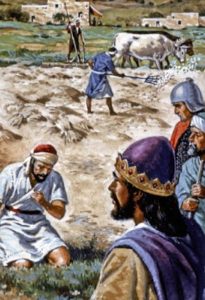 David is obedient and offers to purchase the threshing floor of Araunah. Araunah offers to give it to him as a gift, including the animals to sacrifice on the altar.
David is obedient and offers to purchase the threshing floor of Araunah. Araunah offers to give it to him as a gift, including the animals to sacrifice on the altar.
This threshing floor becomes the temple mount in Jerusalem and is on the same shelf of rock, Moriah, where Abraham attempted to offer his son in obedience to the Word of God.
David replies to Araunah,
2 Samuel 24:24 24 However, the king said to Araunah, “No, but I will surely buy it from you for a price, for I will not offer burnt offerings to the LORD my God which cost me nothing.” So David bought the threshing floor and the oxen for fifty shekels of silver.
TODAY’S READING FROM THE NEW TESTAMENT ACTS 3:1-26
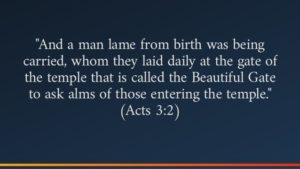 In the account of Peter and John encountering the lame beggar in Acts 3, we witness the powerful effect that takes place when the church engages the outside world with the gospel.
In the account of Peter and John encountering the lame beggar in Acts 3, we witness the powerful effect that takes place when the church engages the outside world with the gospel.
This is the first and most lengthy account of a physical healing in the Book of Acts.
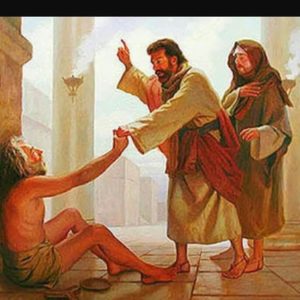 Luke takes the time to record this incident because he wants us to understand that it led to the first confrontation with the religious authorities and the first persecution of the church.
Luke takes the time to record this incident because he wants us to understand that it led to the first confrontation with the religious authorities and the first persecution of the church.
Peter and John see the man who had been a fixture at the temple gate called Beautiful. The lame man had been around during Jesus’ ministry but perhaps had not encountered Him.
As the lame man begs for alms, Peter and John command his attention and, directed by the Spirit, command a miracle.
Acts 3:6-7 6 But Peter said, “I do not possess silver and gold, but what I do have I give to you: In the name of Jesus Christ the Nazarene—walk!” 7 And seizing him by the right hand, he raised him up; and immediately his feet and his ankles were strengthened.
 It is a straightforward account. The man stands upright. He walks. He leaps. He goes where he could not go before. He goes into the temple with Peter and John, praising God.
It is a straightforward account. The man stands upright. He walks. He leaps. He goes where he could not go before. He goes into the temple with Peter and John, praising God.
Peter takes the opportunity to preach Christ when he sees that a crowd is being gathered to observe the healed man.
Peter makes it clear that God is glorifying the Name of the very same Jesus, whom they had only months ago called to be crucified. Peter refers to Jesus as the Holy and Righteous One, the Prince of Life, the One that had been crucified and God has raised from the dead. On the basis of faith in His Name and the faith that comes through Him, this man now stands before them in perfect health.
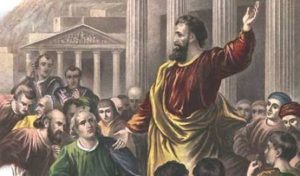 Peter boldly announces that Jesus is the One who was foretold by the prophets (Acts 3:24), the promised seed of Abraham (Genesis 12:3; Acts 3:25), and the prophet Moses foretold as the One to whom all obedience was due (Acts 3:22). Reject Him at your own peril (Deuteronomy 18:19; Acts 3:23).
Peter boldly announces that Jesus is the One who was foretold by the prophets (Acts 3:24), the promised seed of Abraham (Genesis 12:3; Acts 3:25), and the prophet Moses foretold as the One to whom all obedience was due (Acts 3:22). Reject Him at your own peril (Deuteronomy 18:19; Acts 3:23).
Peter preaches not only Who Jesus is but what He has accomplished in the cross. He proclaims the purpose of His death, burial, and resurrection as our Substitute so that our sins may be wiped away and that times of refreshing may come from the presence of the Lord. He calls upon his hearers to repent and believe.
TODAY’S READING FROM THE BOOK OF PSALMS- PSALM 123:1-4
 The song is another psalm of pilgrimage. As pilgrims go up to Jerusalem, they need to lift their eyes up to the Lord.
The song is another psalm of pilgrimage. As pilgrims go up to Jerusalem, they need to lift their eyes up to the Lord.
Psalm 123:1 1 To You I lift up my eyes, O You who are enthroned in the heavens!
Our eyes look to the Lord. He is where our help comes from.
We also need to reflect on our journey as we get closer to the heavenly city.
What do we do when our souls observe the contempt, scoffing, and ridicule of the world? What do we do when our feet need cleansing? Perhaps we get defiled or deceived.
As the maiden looks to the hand of her mistress, and the servant to the hand of his Master, so we look to the Lord, with our earnest plea, “Be gracious to us!” (Ps. 123:3)
TODAY’S READING FROM THE BOOK OF PROVERBS- PROVERBS 16:21-23
Proverbs 16:21-23 21 The wise in heart will be called understanding, And sweetness of speech increases persuasiveness. 22 Understanding is a fountain of life to one who has it, But the discipline of fools is folly. 23 The heart of the wise instructs his mouth and adds persuasiveness to his lips.
Wise speech will bolster your reputation as one who has understanding and is competent. Jesus said that our speech reveals what is in our heart, therefore it is wise to get a new heart (Ezekiel 36:26), gain understanding before speaking and to use words that respectfully engage the hearer.
PRAYER: Lord, search my heart and see if there be any wicked way in me, lest I sin against You and others. You know every thought and motive of the heart. As David prayed, Create in me a clean heart. Keep me from presumptuous sins and the sins of pride. May my confidence be only in You, my strength, my song, and my salvation. May I be bold to offer what I have in You to others. In Jesus’ Name. Amen.
Pastor David
